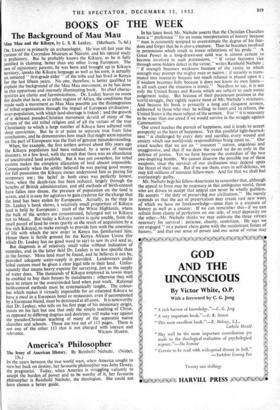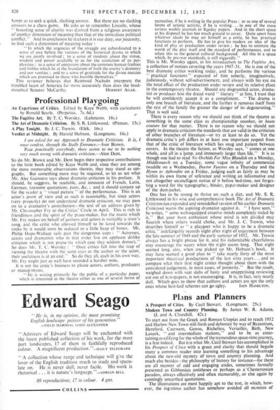America's Philosopher
The Irony of American History. By Reinhold Niebuhr. (Nisbet. 15s.) IN the years between the two world wars, when America sought to turn her back on destiny, her favourite philosopher was John Dewey, the pragmatist. Today, when America is struggling valiantly to accept the burden of power and to be worthy of it, her favourite philosopher is Reinhold Niebuhr, the theologian. She could not have chosen a better guide. In his latest book Mr. Niebuhr asserts that the Christian Churches have a " preference " for an ironic interpretation of history because " man is constantly tempted to overestimate the degree of his free- dom and forget that he is also a creature. Thus he becomes involved in pretensions which result in ironic refutations of his pride." A Great Power in a long-drawn-out cold war is almost certain to become involved 'in such pretensions. " If virtue becomes vice through some hidden defect in the virtue," writes Reinhold Niebuhr ; " if strength becomes weakness because of the vanity to which strength may prompt the mighty man or nation ; if security is trans- muted into insecurity because too much reliance is placed upon it ; if wisdom becomes folly because it does not know its own limits— in all such cases the situation is ironic." Needless to say, it is not only the United States and Russia which are subject to such ironic judgement today. But because of their paramount position in the world-struggle, they rightly receive most of Mr. Niebuhr's strictures. And because his book is primarily a long and eloquent sermon, addressed to those who may be willing to listen and to reform, the United States is the main subject of the sermon. For " it is necessary to be wiser than our creed if we would survive in the struggle against Communism."
Our creed teaches the pursuit of happiness, and it tends to accept prosperity as the basis of happiness. Yet this youthful light-hearted- ness " is challenged by every duty and sacrifice, every wound and anxiety which our world-wide responsibilities bring upon us." Our creed teaches that we are an " innocent " nation, unjealous and unaggressive, and that if we draw the sword we do so only in the defence of justice. Yet we have become the custodian of the two awe-inspiring bombs. We cannot disavow the possible use of these weapons, since the survival of our civilisation may depend upon the threat of their use. But if we use them, even in self-defence, we may kill millions of innocent fellow-men. And for that we shall feel everlastingly guilty.
Mr. Niebuhr begs his fellow-Americans to remember that, although the appeal to force may be necessary in this ambiguous world, those who are driven to accept that appeal can never be wholly guiltless. He accepts " the duty of presen*g our civilisation." He merely reminds us that the act of preservation may create vast new woes of which we have no foreknowledge—since man is a creature of history as well as a creator. If we can remember this—if we can refrain from claims of perfection on our side, of total depravity on the other—Mr. Niebuhr thinks we may cultivate the three virtues necessary for survival : patience, charity, contrition. He says we are engaged " in a patient chess game with the recalcitrant forces of history," and that our sense of power and our sense of virtue may tempt us to seek a quick, slashing answer. But there are no slashing answers to a chess game. He asks us to remember Lincoln, whose " brooding sense of charity was derived from a religious awareness of another dimension of meaning than that of the immediate political conflict." And in conclusion he declares it is our duty, our necessity, to find such a dimension of meaning today :
" In which the urgencies of the struggle are subordinated to a sense of awe before the vastness of the historical drama in which we are jointly involved ; to a sense of modesty about the virtue, wisdom and power available to us for the resolution of its per- plexities ; to a sense of contrition about the common human frailties and foibles which lie at the foundation of both the enemy's demonry and our vanities ; and to a sense of gratitude for the divine mercies which are promised to those who humble themselves."
This reviewer believes that Reinhold Niebuhr interprets the troubled heart of America far more accurately than does the loud-



































 Previous page
Previous page